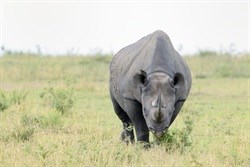
Top stories




ESG & Sustainability#BudgetSpeech2026: SRD grant unchanged, other Sassa social grants see hike
5 hours


More news











ESG & Sustainability
South Africa’s carbon tax should stay: climate scientists explain why











"We are now ready to move, and to begin implementation of our entire rhino management strategy. Relocation is the core of our approach - not only to combat poaching, but to ensure the continued growth of the rhino population," SANParks chairman, Kuseni Dlamini, said.
"We aim to restimulate growth in large protected areas while creating new rhino strongholds. In this way, we will be able to offset the effects of poaching in the short to medium term, while expanding rhino range and improving the overall population size."
"The strategy is multi-faceted, and includes relocating some rhino from the Kruger National Park to create rhino strongholds in other parts of the country - ensuring that the broader population continues to grow," Dlamini explained.
"Increasing births and decreasing death rates, through the relocation exercise, will stimulate growth in large protected areas and maximise growth in rhino strongholds - allowing South Africa to offset poaching effects in the short to medium term while also expanding rhino range and growing the overall population size."
The relocation of 1,450 rhino from the park between 1997 and 2013 has contributed significantly to the growth of the South African rhino population.
SANParks is currently finalising provisions for the sale of rhino and will call for offers to purchase in a series of newspaper advertisements soon. Dlamini emphasised that SANParks will strictly regulate prospective purchasers, and require them to sign agreements to ensure relocated animals contribute to the conservation of the species and the growth of the rhino population as a whole.
A due diligence process will be followed with all sales, including background checks on prospective buyers, and anyone wanting to purchase more than 20 rhino has to comply with habitat and ecological suitability and security requirements. The due diligence process includes a risk assessment to ensure the safety of the animals, and buyers will be required to present a security plan that ensures the animals' safety as well as a conservation plan.